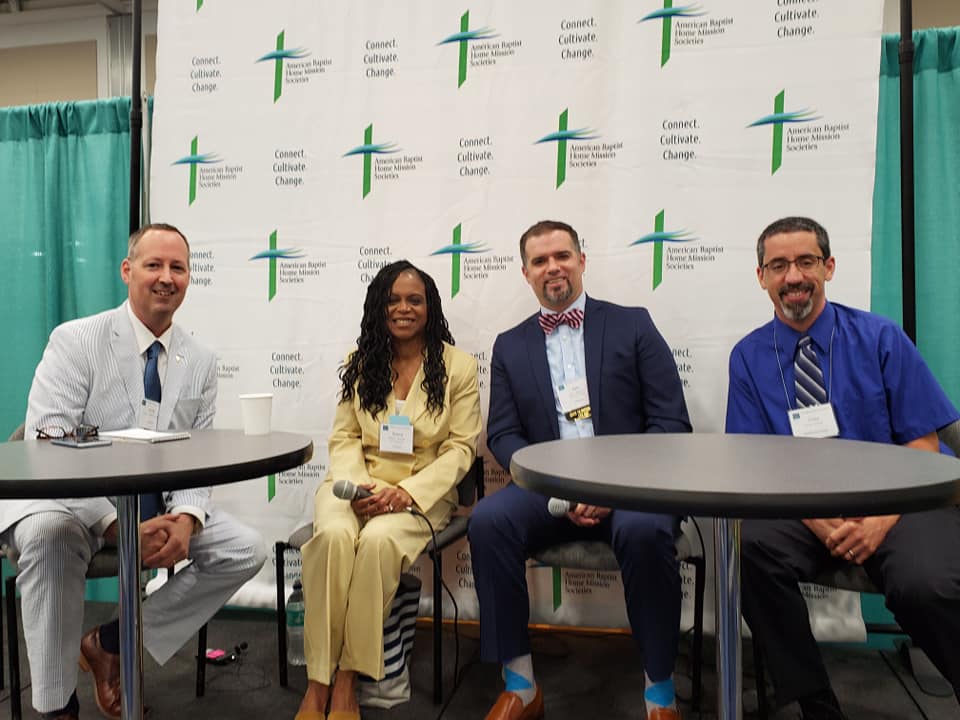
Rev. Dr. Corey Fields (far right) is joined at the table by (from left to right) Christian Citizen editor Curtis Ramsey-Lucas, Rev. Dr. Debora Jackson and Rev. Alan Rudnick.
“When in doubt, meet me at the table”

Rev. Dr. Corey Fields
March 16, 2020
The following is an edited version of a message the author gave to a gathering of American Baptist regional executive ministers during a consultation hosted by American Baptist Home Mission Societies, January 28, 2020.
I was playing a card game with a group of people when I looked across the room and saw Gary and Ken playing chess. I took a moment to stand up and snap a picture. To most people, it would have looked just like two guys playing chess. But just a year earlier, Ken was raging about Gary, who is homeless and has many health problems. He didn’t like him sleeping in public, he didn’t like how he seemed not to be trying. He wanted him out of sight.
A year later, they’re playing chess together.
Ken has his own checkered past, and I think saw too much of his former self in Gary. As Ken was gently led to remember his time of need and what the body of Christ did for him, his heart began to soften. Both Gary and Ken have experienced transformation. But it wasn’t because of what denomination their church is a part of. It wasn’t because they made sure we checked all their theological boxes. It was because they found a group of Christians that said, ‘You are part of the body.’ “The eye cannot say to the hand, ‘I don’t need you’” (1 Corinthians 12:21 NIV).
A block away from our church is an alternative sentencing group home for drug addicted women who are pregnant or nursing. Three of our church members meet and study the Bible with them weekly. One prepares and teaches a lesson. Another has found a role in developing a deep connection with these women because she has struggled with addiction herself. And the third one, well into her 80s, is there to hold the babies and be “granny.”
The stories of the women in this group home are painful beyond belief. One was introduced to drugs at 8 years old. One was in a horrific car accident and got addicted to the painkillers she was prescribed. We have baptized several of these women as new believers. They have experienced transformation. Not because they’ve made sure that everyone in the church shares their view of this or that issue, or because they’ve learned about dispensationalism, but because they answered Christ’s call to repentance and new life and thus took their place at the table where the rest of us have also been welcomed.
The New Testament stubbornly seems to put grace, welcome, and community first before anything else. Jesus broke bread with a group of people who largely didn’t understand him, even including one whom he knew was going to betray him (Matthew 26:20-21). Jesus showed mercy to the woman caught in adultery. Puerto Rican pastor Carlos Rodriguez has a great reflection on this story: “Yes, Jesus said ‘Go and sin no more.’ But that was after he saved the woman from an oppressive system that wanted to kill her. And after calling out the hypocrisy of its religious leaders. And after telling her, ‘I don’t condemn you.’ So let’s try his sequence.”
The apostle Paul urges us, “If it is possible, as far as it depends on you, live at peace with everyone” (Romans 12:18 NIV). At the end of the Gospel of John, Jesus invites the one who denied him to come back into a relationship of love and feed his sheep (John 21:15-23). In Acts 10, that same Peter gets up and goes to that centurion’s house after first saying, “Surely not.” (Acts 10:9-48).
It’s almost as if Jesus is saying, ‘When in doubt, meet me at the table.’
Every January 18-25, the World Council of Churches urges us to pray for Christian unity. Jesus not only prayed for that but exemplified it. He had plenty of criticism for the Pharisees, but he was willing to dine with them if they would have him (Luke 7:36). Jesus did not pretend that the Samaritan woman’s traditions were not less informed (John 4:22), yet he held fast to the vision that all would be united in worship (John 4:21, 23).
Dr. Martin Luther King, Jr. did not shy away from criticizing fellow believers who were hurting the cause of justice. Yet, in that same letter, he said, “We are caught in an inescapable network of mutuality, tied in a single garment of destiny.”
Yet, for us, so many times, Christian unity seems to be one of the first things to go.
We don’t create community for ourselves out of convenience. We do not, by the power of our own goodwill or by some self-righteous patronizing pity for our neighbor, create sacred space where we encounter the other for our own edification should we so choose. No, what Scripture affirms and what some of these authors capture is that the “beloved community” is God’s idea, God’s creation, even God’s very being (as Father, Son, and Holy Spirit). It is woven into the existential fabric of this world, giving us two choices: we can engage and live in this reality, or our souls and our institutions can wither and die slowly. The beloved community is not a perk. It is the very agent of our transformation into the image of Christ.
14th-century Italian mystic Catherine of Siena, writing in the voice of God, said: “I could easily have created [humanity] possessed of all that they should need both for body and soul, but I wish that one should have need of the other, and that they should be my ministers to administer the graces and gifts that they have received from me.”[i]
In “Life Together,” Bonhoeffer said that our Christian communities break down because they came from a “wish dream.” He said you can’t make this thing what you want it to be, and Christ’s table is so radically inclusive that we have to go through disillusionment to be able to understand it and be a part of it. He said, “Only that fellowship which faces such disillusionment, with all its unhappy and ugly aspects, begins to be what it should be in God’s sight, begins to grasp in faith the promise that is given to it.”[ii]
If someone joins a church or ministry because they believe the church is “right,” preaches the right thing, etc., are they there because they have been enraptured by the sweet, sweet spirit of Christ indwelling in and through that community, or is it that they are quite happy that this community and its teachers can be counted upon to reinforce their worldview and their prejudices and allow them to go to Sunday lunch self-vindicated?
One way to know we are at Christ’s table is if we are unsettled by who is there. One way to know we are at Christ’s table is if we are feeling disoriented by the lack of that which normally brings us flawed humans together in groups.
When in doubt, meet me at the table.
Jesus did not shy away from words of judgment or warning. But the key is to realize to whom those words of judgment and warning were directed. Yes, Jesus warned of weeping and gnashing of teeth. He warned of finding one’s self locked out or too late. He has a long string of “woes” in Matthew 23. But to whom were these warnings directed? Those who presumed to have a say in God’s table guest list.
Paul’s analogy of the human body to talk about Christ’s Church is more powerful than we realize. Not only do we continue to learn how interconnected the human body is, consider this: some of the worst and hardest to treat diseases are those where the body attacks itself.
As we hear Paul say that love is “the most excellent way” (1 Corinthians 12:31), as we read that “God is love” (1 John 4:8), as we read the New Testament several times say that love of neighbor sums up the law (Romans 13:8-10; Galatians 5:14, James 2:8), the message is clear: The greatest heresy of the church is to fail to love. The greatest heresy is to be unmoved by the common humanity we share.
Make no mistake, there are other heresies. There is much we can, do, and should disagree about. But the greatest heresy is not what that brother or sister across the table believes. The greatest form of heresy is when I insist that the Head of the table disinvite them, or when I leave because they are there.
When in doubt, meet me at the table.
The Rev. Dr. Corey Fields is senior pastor of Calvary Baptist Church, Newark, Del.
The views expressed are those of the author and not necessarily those of American Baptist Home Mission Societies.


